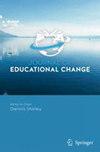Large-scale school improvement: results of and conditions for systemic changes within coupled school systems
IF 2.5
2区 教育学
Q1 EDUCATION & EDUCATIONAL RESEARCH
引用次数: 1
大规模学校改进:耦合学校系统内系统变革的结果和条件
本文章由计算机程序翻译,如有差异,请以英文原文为准。
求助全文
约1分钟内获得全文
求助全文
来源期刊

Journal of Educational Change
EDUCATION & EDUCATIONAL RESEARCH-
CiteScore
5.80
自引率
7.10%
发文量
23
期刊介绍:
The Journal of Educational Change is an international, professionally refereed, state-of-the-art scholarly journal, reflecting the most important ideas and evidence of educational change. The journal brings together some of the most influential thinkers and writers as well as emerging scholars on educational change. It deals with issues like educational innovation, reform and restructuring, school improvement and effectiveness, culture-building, inspection, school-review, and change management. It examines why some people resist change and what their resistance means. It looks at how men and women, older teachers and younger teachers, students, parents and others experience change differently. It looks at the positive aspects of change but does not hesitate to raise uncomfortable questions about many aspects of educational change either. It looks critically and controversially at the social, economic, cultural and political forces that are driving educational change. The Journal of Educational Change welcomes and supports contributions from a range of disciplines, including history, psychology, political science, sociology, anthropology, philosophy and administrative and organizational theory, and from a broad spectrum of methodologies including quantitative and qualitative approaches, documentary study, action research and conceptual development. School leaders, system administrators, teacher leaders, consultants, facilitators, educational researchers, staff developers and change agents of all kinds will find this journal an indispensable resource for guiding them to both classic and cutting-edge understandings of educational change. No other journal provides such comprehensive coverage of the field of educational change.
 求助内容:
求助内容: 应助结果提醒方式:
应助结果提醒方式:


